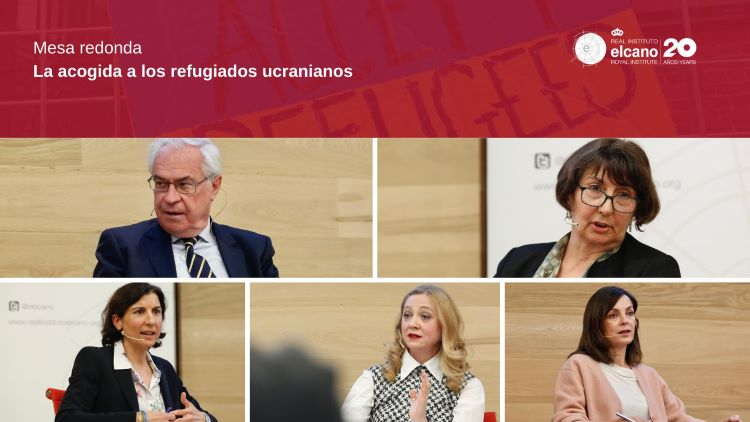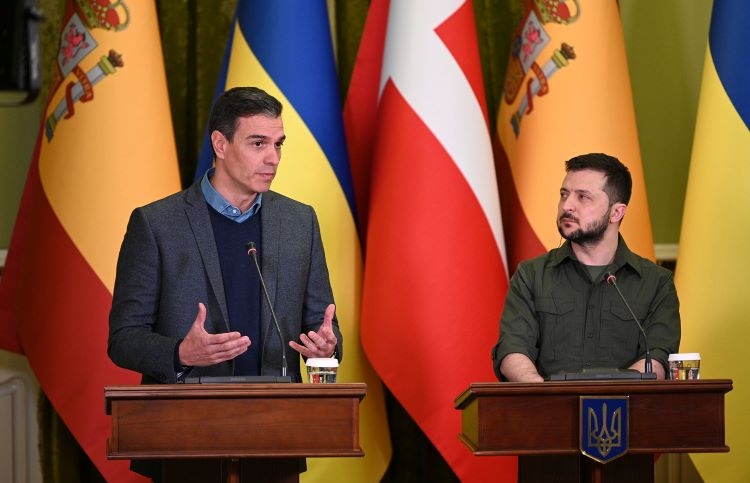Eduardo González
The massive reception of Ukrainian refugees in Europe responds to both humanitarian and geostrategic reasons, because, unlike other previous cases, in this war the EU states are not mere “spectators” and have chosen to be “participants” in a conflict in which “Russia is perceived as the enemy”.
These are some of the conclusions exposed yesterday by Carmen González Enríquez, senior researcher at the Elcano Royal Institute, during the round table The reception of Ukrainian refugees, organized at the headquarters of the Botín Foundation in Madrid and presented and moderated by Charles Powell, director of the think tank.
“The difference with other refugee welcomes is that it happens in a war in which we are not only spectators, but EU unanimously supports Ukraine against Russia because it is considered a just cause and because Russia is perceived as an enemy,” said González. “Supporting Ukraine with armaments and sanctions against Russia makes us participants” and, therefore, “Ukrainian refugees are especially welcome not only because they are white and Christian, as has been said, but because they are allies in a war that affects us all,” she continued.
“That explains why neighboring countries such as Poland and Hungary have a completely different attitude than they did with refugees from other areas of the world,” she added. “It’s not just a human rights or humanitarian issue, it’s a geostrategic issue, and to approach it only from humanitarian management is to leave half the story out of the analysis,” she warned.
Directly related to this, in the opinion of the researcher, one of the factors that explain the effective management of the reception of Ukrainian refugees in the EU is precisely the “political unanimity on the need to take in Ukrainian refugees”, since “in no EU country has there been any protest against it, not even from the most xenophobic parties or those closest to Vladimir Putin”.
Another factor influencing this, she added, is the “natural and spontaneous distribution of refugees, who first pass through neighboring countries and then move to countries where there are significant communities of Ukrainians, especially since 2014.” That is especially the case in Germany, Poland (two million pre-war), Italy and Spain (112,000 Ukrainians before the war and around 250,000 now). The third major factor, she explained, is “the voluntary effort of society”. “A good part of the reception rests on the society and the European states would not be able to finance this reception if it were not for the fact that it rests on Ukrainian and non-Ukrainian families,” she assured.
Foster care pilot project
Precisely, the general director for the Management of the Reception System for International and Temporary Protection of the Ministry of Inclusion, Social Security and Migration, Amapola Blasco, announced at the same event the upcoming implementation of a pilot project for foster care. “We are going to start already this week with the first meetings between Spanish families offering to host Ukrainian families”, she specified. The project has been launched in Malaga, Murcia, Barcelona and Madrid, although it could be extended to other parts of the country.
Likewise, Blasco highlighted, as a positive fact, that the massive arrival of Ukrainians “has made it possible to review the Spanish reception system” and has “precipitated” the implementation of the large refugee reception centers, specifically in Madrid, Alicante, Barcelona and Malaga, which offer comprehensive care to refugees and in which some 34,000 people have already been documented, almost half of the 67,000 who have temporary protection in Spain. “It has been set up in just four weeks what was planned to be set up in four years,” she stressed.
For her part, the head of the Asylum Unit in the European Commission’s Directorate General for Home Affairs and Migration, Esther Pozo, warned that the crisis in Ukraine should not make us forget the EU’s objective of reaching a common legal framework on migration for all Member States and said, in this regard, that the French Presidency’s project for a migration pact was based on a gradual methodology in phases, but “the timetable was disrupted” by the war. In any case, she assured that the objective of approving the first phase of the pact at the June European Council remains, although “everything depends on how the French Presidency progresses and what happens on Sunday” with the second round of the French presidential elections.
Finally, Sophie Muller, UNHCR representative in Spain, reported that the EU has already taken in five million Ukrainians in less than two months (“the largest displacement in Europe since the Second World War) and that 90% of these people are women and children, belonging to “separated families who leave in Ukraine their husbands, brothers, sons and grandfathers, the male part of the families”. She also praised “the exemplary response of the neighboring countries”.
Precisely, the chargé d’affaires of the Polish Embassy, Karina Węgrzynowska, asked to speak from the audience to explain the role of her country in welcoming “all those fleeing the war, regardless of their nationality”, for whom “mechanisms have been put in place for access to the labor market, medical services and the education system” and have been provided with a monthly allowance of 120 euros to care for children.






